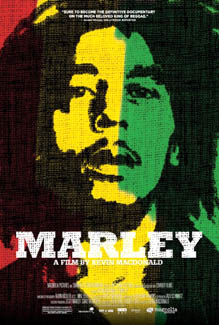
Starts May 17
Original language: English with Jamaican accents
 This is it: the documentary about the life of Bob Marley, one of the most successful musicians in the 20th century or as Wikipedia says, “the first third-world rock star.” Scottish director Kevin Macdonald takes us to the island of Jamaica where Marley was born February 6, 1945, to a black mother Cedella Booker and a white British father Norvel Sinclair Marley, originally from Sussex. As a teenager he began to make music and gradually cut records, making the reggae style of music famous. In 1963 he formed the band which became The Wailers. He joined the Rastafarian movement, wore the characteristic dreadlocks and believed, as the Rastafarians did, that Haile Selassie (emperor of Ethiopia) was the second coming of Christ. His big break came in London when producer and founder of Island Records Chris Blackwell agreed to give him the financial support necessary to cut an album, which he did in Jamaica. They became good friends and eventually Marley took over Blackwell’s house in Jamaica, the famous 56 Hope Road, which was also his office and meeting place for musicians and friends from all over the world. Although married to Rita Anderson, he had various affairs, and eleven children from seven wives are officially recognized as his. He became ill with cancer, kept on performing until his last concert which was September 1980 in Pittsburgh, USA. He sought medical help from Doctor Josef Issels, a German with a hospital in Bavaria. He died of cancer in Florida on May 11, 1981, as he attempted a final return flight to his Jamaican home.
This is it: the documentary about the life of Bob Marley, one of the most successful musicians in the 20th century or as Wikipedia says, “the first third-world rock star.” Scottish director Kevin Macdonald takes us to the island of Jamaica where Marley was born February 6, 1945, to a black mother Cedella Booker and a white British father Norvel Sinclair Marley, originally from Sussex. As a teenager he began to make music and gradually cut records, making the reggae style of music famous. In 1963 he formed the band which became The Wailers. He joined the Rastafarian movement, wore the characteristic dreadlocks and believed, as the Rastafarians did, that Haile Selassie (emperor of Ethiopia) was the second coming of Christ. His big break came in London when producer and founder of Island Records Chris Blackwell agreed to give him the financial support necessary to cut an album, which he did in Jamaica. They became good friends and eventually Marley took over Blackwell’s house in Jamaica, the famous 56 Hope Road, which was also his office and meeting place for musicians and friends from all over the world. Although married to Rita Anderson, he had various affairs, and eleven children from seven wives are officially recognized as his. He became ill with cancer, kept on performing until his last concert which was September 1980 in Pittsburgh, USA. He sought medical help from Doctor Josef Issels, a German with a hospital in Bavaria. He died of cancer in Florida on May 11, 1981, as he attempted a final return flight to his Jamaican home.
All of this is in the film. Naturally, you can get the facts from many historical sources, but these sources can never relay the spirit of the film: the green mountains, the crowded streets of Kingston, the lilting Jamaican English, as well as the music itself. I counted 66 songs. Former band members, leaders in the music world, his wife Rita, some girl friends, two of his adult children, the British half siblings from his father’s relationships in Great Britain, and many others, appear on screen to share their oral histories. Marley used music and his vision of a peaceful world to further political activism both in Jamaica and Zimbabwe, as well as in other countries; once he and members of his family were injured during a terrorist attack on his house.
Marley the film was my absolute favourite at the 2012 Berlinale film festival. At the press conference, his son Rohan Marley, complete with Rastafarian dreadlocks, answered questions about growing up with his father, “We may call him Daddy, but we were only one of many.” Marley was hugely generous and at least once a week people lined up at his front door asking for favors and financial support for themselves and their children – everyone was his child. Of the 66 songs in the film, 50 were by Marley himself – a unique chance to hear them all in 144 minutes – a long film which never seems long. The Bob Marley charisma literally jumps from the screen, and I was not the only female critic to be totally captivated by his impish smile. Director Macdonald created this work of art, after both Martin Scorsese and Jonathan Demme failed to come through as planned. A big thank you goes to Macdonald from us fans, old and new (like me), for another moment of “I Shot the Sheriff” and “No Woman No Cry.”
